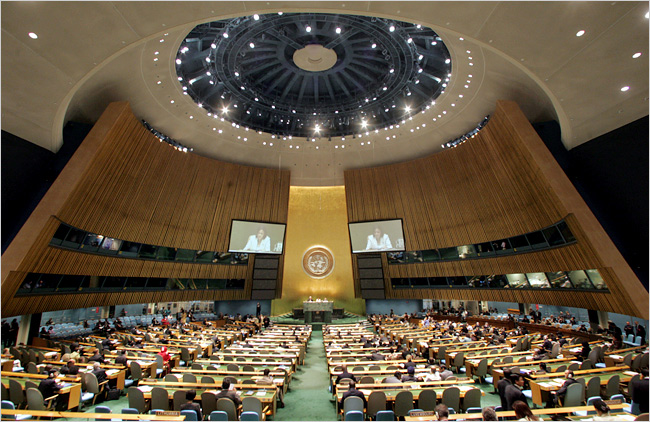At the 37th meeting of the 71st United Nations General Assembly, the U.S. Representative raised concerns regarding Bahrain’s “dissol[ution of] the Al-Wefaq political society, revo[cation of] Sheikh Isa Qassim’s citizenship, and continue[d] detention of] activist Nabeel Rajab and former Al-Wefaq Secretary General Sheikh Ali Salman.” In response, the Government of Bahrain deflected the criticism by stating that the U.S. misunderstood the facts of the cases it cited.
During her right-of-reply, the Bahraini representative, without naming the society, stated that the Bahraini government dissolved Al-Wefaq because its rhetoric “encouraged violent extremism, sectarian discord, and sedition.” The Bahraini government has failed to substantiate any of these allegations. Prior to its dissolution, Al-Wefaq was the largest political opposition group in Bahrain and a vocal critic of repressive government policies. The Bahraini government has repeatedly targeted the opposition bloc. In December 2014, Bahraini security forces’ arrested Sheikh Ali Salman, the Secretary General of Al-Wefaq, and charged him with “inciting hatred” and “encouraging violent regime change.” The authorities cited a speech given by Salman as evidence. However, the speech was simply a peaceful call for political reforms. The government’s action to dissolve the political society and imprison Sheikh Ali Salman was another attempt by the Bahraini authorities to silence peaceful, political dissent.
The right of reply by the Bahraini representative went on to claim that the “revocation of citizenship” against Sheikh Isa Qassim, was based on “an individual failing to fulfill the duties of citizenship.” The Bahraini government claims it revoked the citizenship of Sheikh Isa Qassim, an important Shia leader, because Qassim engaged in money laundering. However, the charge is related to the collection of khums, a Shia practice dating back centuries. Bahraini authorities have further targeted Shia clerics and religious leaders in their harassment and discrimination against the Shia community. This targeting has reached such levels that in August 2016, five U.N. human rights experts released a statement calling on Bahrain to stop its “persecution of Shias.”
Additionally, the Bahraini representative alluded to the case of prominent human rights defender, Nabeel Rajab, who authorities detained on 13 June 2016. Authorities have brought charges against Rajab violating his internationally-sanctioned rights to free expression. The charges cite tweets Rajab published, which call attention to systematic torture in Jau prison and raise concerns regarding human rights violations committed by the Saudi-led coalition in Yemen. However, the Bahraini representative issued a blanket statement exclaiming “no person, including those named, is detained or prosecuted for peaceful freedom of expression.” While in prison, Rajab penned an open letter published in the New York Times. In the letter, Rajab called out government policy “that punishes its people for thinking, that prevents its citizens from exercising their basic rights.” Ironically, the Bahraini government substantiated Rajab’s claims by charging him for voicing his opinions and bringing an additional charge against him.
Americans for Democracy & Human Rights (ADHRB) welcomes the U.S. representative’s efforts to raise the cases of Sheikh Ali Salman, Sheikh Isa Qassim, and Nabeel Rajab. It is vital that the U.S. Government continues to publicly voice its concern over the ongoing detention of prisoners of conscience in Bahrain and continue highlighting human rights violations committed by the Bahraini government while encouraging sustainable reform.
The Bahraini government, as a signatory of the International Covenant on Civil and Political Rights and the Universal Declaration of Human Rights, has international obligations to guarantee its citizens’ rights to freedom of expression, religion, and association. Bahrain should immediately release Sheikh
Ali Salman, Nabeel Rajab, and all prisoners of conscience who are in detention for exercising their rights to free expression. Additionally, the Government of Bahrain should reinstate Sheikh Isa Qassim’s citizenship, which was arbitrarily revoked, and drop the money-laundering charges against him.
Danielle Lilly is an Advocacy Intern at ADHRB.





